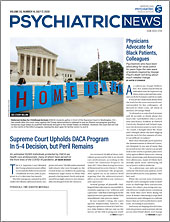Depression affects up to half of patients with Parkinson’s disease, but the physical symptoms of their condition can make it difficult for them to travel to and from appointments for treatment. A study in Neurology suggests that cognitive-behavioral therapy (CBT) delivered over the telephone can be an effective option for this population.
“Patients with Parkinson’s disease are complex medically and psychologically, and telemedicine can be a feasible and effective platform for delivering evidence-based psychotherapy for a heterogeneous group of individuals who face major access barriers to care,” lead author Roseanne Dobkin, Ph.D., a professor of psychiatry at Rutgers-Robert Wood Johnson Medical School in Piscataway, N.J., told Psychiatric News. “There are significant biological and psychosocial vulnerabilities that increase the risk for depression in patients with Parkinson’s disease. However, nonpharmacological interventions such as CBT can significantly improve mood, enhance quality of life, and improve all aspects of Parkinson’s disease management when appropriately tailored to the unique needs of this population.”
Dobkin and her colleagues divided 72 people with Parkinson’s disease and depression into two groups. One group received treatment as usual, defined as routine medical and psychiatric treatment from their health care team without input from the researchers. Treatment as usual included taking antidepressant medication, receiving in-person psychotherapy, or both. The other group received treatment as usual and 10 weekly one-hour CBT sessions over the phone, with an option to continue with monthly sessions for another six months. CBT targeted negative thoughts such as “I’m helpless” and behaviors such as lack of exercise.
At the end of the study, mean scores on the Hamilton Depression Rating Scale decreased 6.53 points for those in the CBT group compared with an increase of 0.27 points for those who received treatment as usual. Those in the CBT group also reported greater improvements in daily functioning and quality of life. Results were similar at the six-month follow-up. The researchers found that a significant decrease in negative thoughts was a primary driver of improved mood for individuals who received CBT.
“A key part of adaptive coping involves learning the skills needed to modify extreme and untrue negative thoughts that block proactive engagement in one’s life,” Dobkin explained. “CBT enabled [patients] to press pause on negative thoughts and predictions that occurred automatically so they could reframe them in a healthier and more accurate way.”
Patient interest in participating in the study was overwhelming, with those who enrolled asking to share informational materials with support groups and other social networks in the Parkinson’s disease community, Dobkin said. “They were hungry for information and eager to learn and apply new coping skills in their day-to-day lives. We were able to fill a critical treatment gap with respect to mental health care for people with Parkinson’s disease.”
Dobkin noted that the findings are particularly relevant during the COVID-19 pandemic. In April, the Centers for Medicare and Medicaid Services issued a new rule permitting audio-only telephone care for several psychiatry codes retroactive to March 1, and announced that it would increase payments for audio-only telephone visits between Medicare beneficiaries and their physicians to match payments for similar office and outpatient visits.
“One of the main limitations to [mental health professionals] embracing either audio or video telemedicine was that there was no reimbursement for it, or reimbursement was only possible in very narrowly defined circumstances,” Dobkin said. “The new reimbursement guidance provides us with greater flexibility and a wider range of options to connect patients with needed psychosocial services. We have data to show that telemedicine services are feasible and efficacious. There is no reason not to continue to use telemedicine to leverage patient access to informed mental health care after the COVID crisis passes.”
This study was funded by the Michael J. Fox Foundation for Parkinson’s Research and the Parkinson’s Alliance (Parkinson’s Unity Walk). ■
“Telephone-based Cognitive Behavioral Therapy for Depression in Parkinson Disease: A Randomized Controlled Trial” is posted
here.

